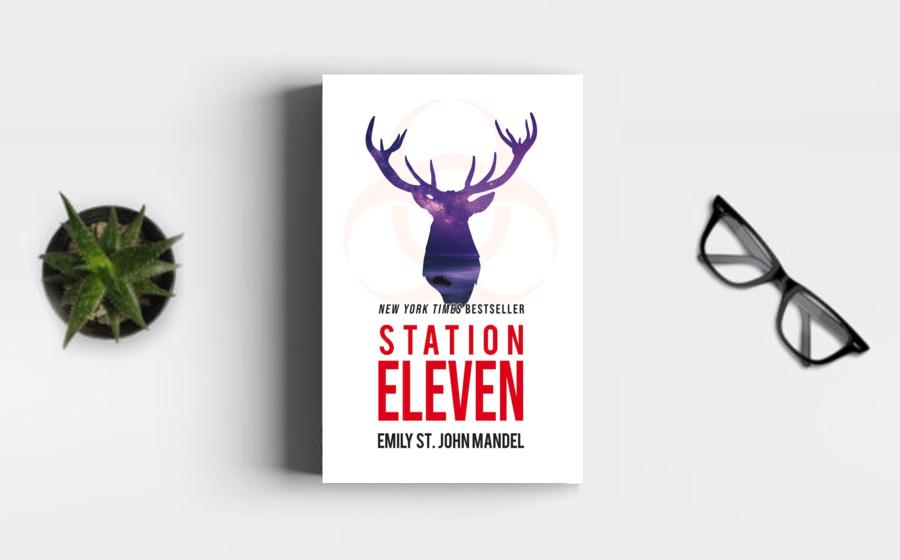"Station Eleven," published in 2014, has firmly
established itself as a contemporary classic,
captivating readers with its intricate narrative
structure, poignant exploration of human connection, and
the enduring power of art in the face of apocalyptic
adversity. Set against the backdrop of a pandemic that
wipes out most of civilization, the novel weaves
together the lives of seemingly disparate characters,
exploring the intersections of their pasts and presents.
As we delve into the reasons behind its widespread
acclaim and enduring significance, it becomes clear that
"Station Eleven" is a modern masterpiece that transcends
the boundaries of the post-apocalyptic genre, offering a
timeless reflection on the human condition.
At
the heart of the novel is Mandel's masterful narrative
craftsmanship, employing a non-linear structure that
effortlessly moves between different timelines and
perspectives. The narrative unfolds like a mosaic,
gradually revealing the interconnected lives of its
characters. This approach mirrors the novel's thematic
exploration of the interconnectedness of human
experiences and the ripples of cause and effect that
shape destinies. Mandel's narrative technique elevates
"Station Eleven" to the status of a contemporary
classic, as it challenges conventional storytelling
norms, creating a multi-layered and emotionally resonant
tapestry.
The characters in "Station Eleven" are
intricately woven into the fabric of the narrative, each
contributing to the novel's exploration of survival,
resilience, and the enduring impact of art. The novel
follows a diverse cast of characters, from the famous
actor Arthur Leander to the Traveling Symphony - a group
of musicians and actors who traverse the desolate
landscape performing Shakespearean plays. Mandel
skillfully depicts the complexities of human
relationships, capturing the fragility of connections in
a world altered by catastrophe. The characters' pursuit
of meaning and connection, both before and after the
collapse of civilization, becomes a central theme that
resonates with readers on a profound and universal
level.
Central to the novel's acclaim is its
meditation on the resilience of the human spirit and the
enduring nature of art. As the characters navigate a
world where civilization has crumbled, the Traveling
Symphony becomes a symbol of cultural preservation and a
testament to the transformative power of art. The
troupe's commitment to performing Shakespeare's plays in
the midst of chaos reflects the belief in the intrinsic
value of art and its ability to uplift, inspire, and
provide solace even in the bleakest of circumstances.
Mandel's exploration of the role of art in preserving
humanity's collective memory elevates "Station Eleven"
beyond a traditional post-apocalyptic narrative, making
it a timeless reflection on the enduring impact of
creativity and culture.
The novel's thematic
depth extends to its portrayal of the interconnectedness
of lives and the consequences of individual choices.
Mandel navigates between timelines, revealing the ripple
effects of characters' actions and decisions. The novel
becomes a meditation on the complexity of cause and
effect, emphasizing the idea that even small moments can
shape the course of history. By examining the
interconnected lives of its characters, "Station Eleven"
prompts readers to reflect on the profound and often
unpredictable ways in which individuals and communities
influence each other.
Mandel's exploration of the
fragility of civilization and the potential for rebirth
adds layers of complexity to the narrative. The novel
presents a world where the remnants of the past coexist
with the efforts to rebuild a new society. The Museum of
Civilization, a collection of artifacts from the old
world, becomes a poignant symbol of memory and the
transient nature of human achievements. "Station Eleven"
invites readers to consider the cyclical nature of
history and the possibility of renewal, emphasizing the
human capacity to adapt, create, and find hope in the
face of adversity.
The novel's prose is both
lyrical and evocative, capturing the beauty of the
natural world and the haunting emptiness of a
civilization in ruins. Mandel's descriptive language
transports readers to the stark landscapes and decaying
remnants of cities, creating a sensory experience that
enhances the novel's emotional impact. The juxtaposition
of beauty and desolation becomes a recurring motif,
underscoring the novel's exploration of the dual nature
of existence and the resilience of life amid
destruction.
"Station Eleven" has received
widespread critical acclaim, earning nominations for
prestigious literary awards such as the National Book
Award and the PEN/Faulkner Award for Fiction. Its
inclusion in educational curricula, book clubs, and
discussions about the post-apocalyptic genre attests to
its enduring relevance and impact on contemporary
literature. The novel's recognition extends beyond the
literary realm, with adaptations into other mediums,
including a graphic novel and plans for a television
series, highlighting its cultural significance and the
desire to explore its themes in various artistic forms.
"Station Eleven" by Emily St. John Mandel is a contemporary classic that transcends the conventions of the post-apocalyptic genre, offering a profound exploration of survival, connection, and the enduring power of art. Mandel's narrative craftsmanship, thematic depth, and lyrical prose contribute to the novel's enduring significance, prompting readers to reflect on the fragility of civilization, the interconnectedness of human experiences.






